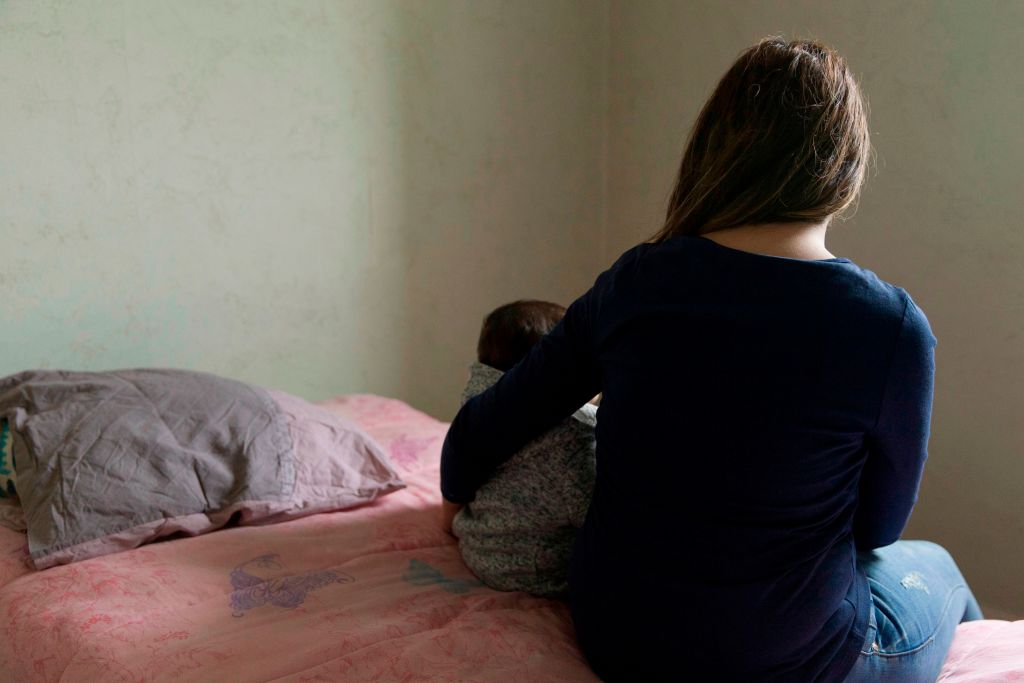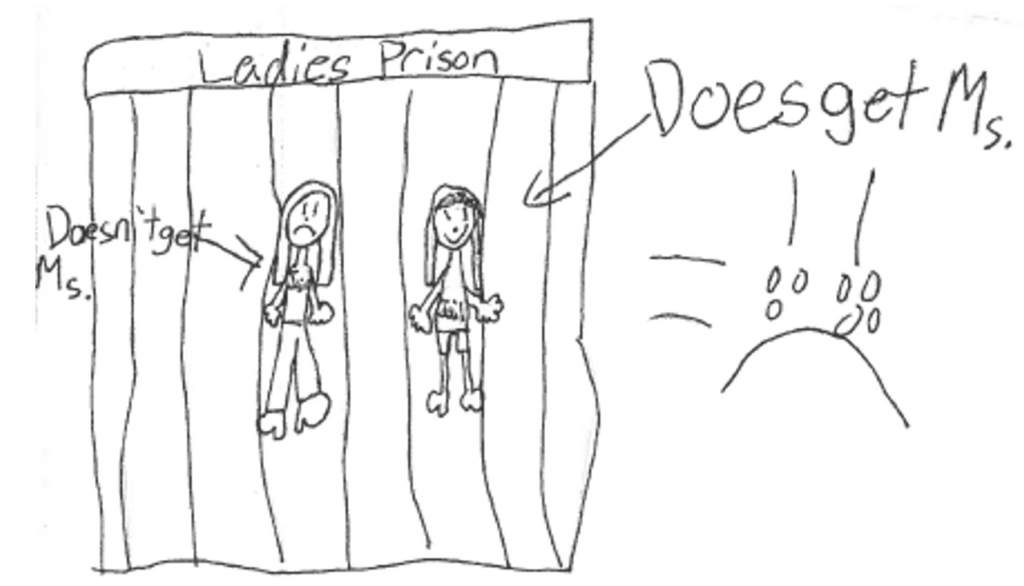
Out of sight should not mean out of heart and mind. But the tragedy for women in prison is that it often does. The women now in prison are often there because of circumstances that might have put you or me there, too.
Over half—58 percent—of women in prison are mothers, and 80 percent of women in jails are mothers. About 5 percent are pregnant and give birth in prison. And in 23 states, women give birth in chains because we have not yet succeeded in even passing anti-shackling laws.
Most women in prison are not a danger to society. More than 60 percent have been convicted of non-violent offenses. Often, they are suffering unfairly harsh consequences even for nonviolent crimes, like possessing or selling illegal drugs. And many of the women convicted of so-called murder have actually killed a violent partner in self-defense, yet not been allowed to plead self-defense—this real motive that would have been allowed in a non-“domestic” setting.
This is part of the reason women and girls are the fastest growing incarcerated population in the United States today. Over the course of the past four decades, women’s prison populations have grown more than 525 percent—twice the rate of men’s incarceration. And the incarceration rates for Black women are almost twice that of their white counterparts.
Once in prison, women also suffer significantly higher rates of sexual victimization and violence by the staff who are supposed to protect them. At the less visible end of the spectrum, prisoners’ mental and physical health often deteriorates, their most basic hygiene and reproductive needs—even access to tampons or pads—are frequently ignored.
Knowledge is power. Learning such facts is a first step to action for us, and feeling seen is a first step toward hope and sanity for those inside. We at Ms. magazine want women in prison to know they are seen and valued. And because domestic violence shelters can be almost as isolating as prisons—and often lack reading material, just as many prisons do—we decided to include women in those shelters in this program too.
That’s why we started the Ms. magazine Prison and Domestic Violence Shelter Program. It is funded by charitable contributions earmarked for this purpose, and also by Ms. community members who buy an extra membership and subscription for a friend they don’t know.
We are able to now send Ms. to 5,418 federal, state and county prisoners. That’s a fraction of the total, but it’s a number we’re very proud of and hope to keep growing.
Women in prison often spend 17 hours a day isolated in their cells, with no reading material except the Bible, or with only books and magazines they must share with hundreds of other women. And this past year has seen reading bans inside prisons grow at a more concerning rate than those in public schools and libraries, according to a report by PEN America.

Over the 19 years since this program’s birth, we’ve discovered that even this small gesture of recognition, support and information means a lot.
Here’s what Elena H. wrote to us from prison in Muncy, Pa., after Ms. published a feature on the rates of COVID infections in women’s prisons:
“The hardest aspects of COVID in prison were the unknowing and the isolation. It was hard to feel heard, to feel like my personhood mattered to anyone. A change began when I participated in Victoria Law’s article in Ms. The article was a spark of dignity. As ‘Prison Outbreak’ restored my idea of dignity, dignity sharpened into indignation. Prison itself is founded on unknowing and isolation and I am not content to consent to its dehumanization.”
We also heard from Tiona Rodriguez who is incarcerated in the Bedford Hills Correctional Facility in Bedford Hills, N.Y.:
“It was exciting to see my name printed in one of Ms. magazine’s articles. I walked into our facility’s library and was stopped by another inmate. She asked me, ‘You’re Tiona Rodriguez, right? I saw your name in the magazine speaking about COVID.’ I felt like I had accomplished something remarkable, something not only beneficial for myself but for all men/women who are in the same position as I am.”
It’s stories like Elena’s and Tiona’s that inspire us to build our Prison and Domestic Violence Program bigger, to reach even more women. And to reflect their reality in our pages.
For instance, Ms. has been reporting on one of the driving forces behind increasing incarceration rates among women: the cash bail system. Sixty-six percent of jailed women who cannot afford bail are mothers of minor children, and the majority are primary caregivers for their families. They remain locked up before their trial simply because they cannot afford to pay bail (a median cost of $11,700 in the U.S.). This is a form of the debtor’s prisons that were eliminated in the 19th century.
Also, data has shown that when a woman is unable to afford bail, she is more likely to be convicted, more likely to receive a longer sentence, and more likely to end up with a lifelong criminal record. Many women also tend not to benefit from plea-bargaining simply because they cannot afford a lawyer.
That’s exactly what happened to Deborah Burlingham, of Las Vegas, who wrote to us after receiving Ms. in prison:
“I recently read your Summer issue and thoroughly enjoyed every article. I especially was impressed with ‘Held for Ransom’ by Sarah Willets. I too was a victim of this practice. I am currently incarcerated for a DUI—no injuries, no property damage. My bail was set at $100,000 cash only! I remained there until my initial court date 33 days later. I was then transferred to prison. Reading and working out are my two periods of sanity every day. Keep up the good work of informing women about important issues.”
The Ms. magazine Prison and Domestic Violence Shelter Program lets women on the inside know they are not alone. Every American should be ashamed that this country puts a greater proportion of its citizens in prison than any other nation on earth, because of racism, sexism, and also because in many states, the prison industrial complex allows corporations to build and run prisons for profit.
And our program lets survivors of domestic violence who are now in shelters know it’s unfair for them to be deprived of home while their abuser is free. We must all work together against notions of “masculinity” and “femininity” that have turned the home into the single most dangerous place for women and children in this country.
Nothing can replace systematic remedies, and nothing can replace reaching out to women in prisons and shelters right now.
If you would like the deep satisfaction of knowing you’re a part of letting women know they’re not alone, please make a tax-deductible contribution to the Ms. Prison and Domestic Violence Shelter Program.
Nine-year-old Anabel, from Los Angeles, explains it best:
“I am 9 and my daddy got me a subscription (in my name) to Ms. magazine. I read my copy once I get it. My daddy and I have enclosed $12, $2 from me and the rest from my daddy. I think it’s sad that women go to jail for no reason and I want to help. Please enjoy the picture I’ve drawn.”

When you send a friend you don’t know a copy of Ms., it will have her name on it, and be something she knows will keep coming—hundreds of pages of words and images that link her to the world of women. Let her know you care by sending her companionship in every issue of Ms.
On the outside, the women’s movement brings us support, facts, creativity, humor, and a sense of community. Pass it on.
A generous donor has pledged a challenge grant of $10,000 if we can raise $20,000 for the Ms. Prison and Domestic Violence Shelter Program. Please give today so that we can secure this important opportunity.
Up next:
U.S. democracy is at a dangerous inflection point—from the demise of abortion rights, to a lack of pay equity and parental leave, to skyrocketing maternal mortality, and attacks on trans health. Left unchecked, these crises will lead to wider gaps in political participation and representation. For 50 years, Ms. has been forging feminist journalism—reporting, rebelling and truth-telling from the front-lines, championing the Equal Rights Amendment, and centering the stories of those most impacted. With all that’s at stake for equality, we are redoubling our commitment for the next 50 years. In turn, we need your help, Support Ms. today with a donation—any amount that is meaningful to you. For as little as $5 each month, you’ll receive the print magazine along with our e-newsletters, action alerts, and invitations to Ms. Studios events and podcasts. We are grateful for your loyalty and ferocity.
This post was originally published on this site be sure to check out more of their content.








